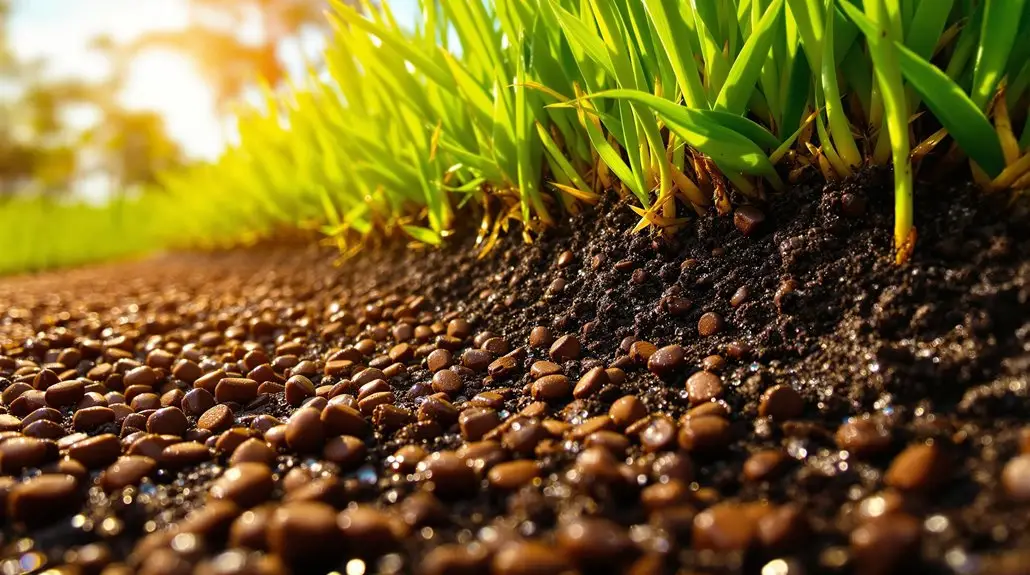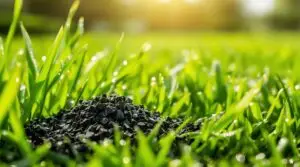How Humic Acids Elevate St. Augustine Grass in South Florida
Humic acids improve St. Augustine grass in South Florida by enhancing soil structure and aeration, which promotes root development and health.
They facilitate better microbial activity, increasing nutrient availability essential for growth, especially nitrogen.
Additionally, humic acids boost the soil’s water retention capabilities, ensuring that the grass remains healthy during dry conditions.
This multifaceted approach not only supports robust grass growth but also improves the overall ecosystem within the soil, revealing further insights into effective lawn care methods.
Unlock the Secret to a Lush Lawn: The Power of Humic Acids
Ready to transform your St. Augustine grass into a vibrant, healthy lawn?
Experience the benefits of humic acids today!
For expert advice and holistic solutions tailored to your lawn care needs in South Florida, reach out to NaturePest Holistic Pest Control.
Let us help you achieve the lush, green lawn you’ve always wanted!
Key Insights
- Humic acids improve soil structure and aeration, promoting better root development and stability in St. Augustine grass.
- They enhance microbial activity, increasing nutrient availability, particularly nitrogen, essential for the grass’s growth.
- Humic acids boost water retention, aiding drought resistance and reducing irrigation needs during dry spells.
- They stimulate robust root systems, helping St. Augustine grass withstand heat and stress effectively.
- Incorporating humic acids supports sustainable lawn care practices, crucial for maintaining healthy grass in South Florida’s coastal areas.
Soil Conditioning and Aeration Benefits

When you incorporate humic acids into the soil, you not only enhance the overall structure but also greatly improve aeration, which is essential for the healthy growth of St. Augustine grass. Humic acids act as binding agents, promoting soil aggregation and creating a more porous environment that facilitates air infiltration. This increased porosity helps reduce soil compaction, allowing for better air circulation and root development. Additionally, humic acids enhance water retention, ensuring consistent moisture levels, which is vital during dry spells. By making the soil crumbly and easier to work with, you improve lawn maintenance efficiency. Moreover, humic acids enhance nutrient uptake by chelating essential macro and micro nutrients, making them more accessible to your grass, ultimately supporting its vigorous growth. This results in improved soil structure, which helps in preventing nutrient loss and promotes overall plant health. Furthermore, the chelation of nutrients by humic acids ensures that key elements are readily available for plant absorption, further enhancing the effectiveness of fertilization efforts. Importantly, humic acids also support microbial activity, which plays a crucial role in nutrient cycling and soil health. Additionally, the use of humic acids can promote nutrient cycling, which is essential for maintaining long-term soil health and productivity. These benefits stem from their ability to increase cation exchange capacity (CEC), enhancing the soil’s nutrient retention capabilities.
Enhancing Microbial Activity in Soil

Humic acids greatly enhance microbial activity in soil, fostering a thriving ecosystem that supports the health of St. Augustine grass. When you apply humic acids, they increase significant soil enzyme activities like urease, phosphatase, and sucrase, which are essential for nutrient cycling. You may notice a rise in microbial populations, ultimately leading to improved biochemical activities. However, be aware that the effect of humic acids can vary depending on their source and application rate. They can also influence the composition of microbial communities, stimulating beneficial species while sometimes inhibiting certain enzymes. This creates a balanced biological activity, ensuring that essential nutrients are available to your grass, thereby promoting overall soil fertility and plant health. Additionally, humic acids improve soil nutrient availability, particularly nitrogen, which is crucial for the vigorous growth of St. Augustine grass. Furthermore, research indicates that soil microorganisms play crucial roles in nutrient cycling and soil fertility, affecting plant growth and health. The application of humic acids also leads to an increase in beneficial bacteria that support the overall health of the soil microbiome. Moreover, humic acids contribute to improved soil structure, which enhances the habitat for microbial life and facilitates better root development in your grass.
Promoting Root Development and Growth

Promoting robust root development and growth in St. Augustine Grass is crucial for its overall health and resilience. By using humic acids in conjunction with bio-stimulants like sea kelp, you can effectively stimulate root growth, which establishes a strong foundation for the grass. Humic acids enhance soil structure, making it more porous, thereby improving air circulation and water infiltration, which are essential for root expansion. Additionally, the stimulation of roots contributes to stress tolerance, allowing St. Augustine Grass to withstand the heat and drought common in South Florida. This combination not only increases root mass and depth but also supports year-round soil health, particularly during the intense summer months, ensuring your grass thrives throughout the year. Furthermore, the use of Root Growth Stimulant can significantly aid in optimizing fertilizer treatments and enhancing microbial life in the soil. The addition of humic acid bio-stimulants improves nutrient uptake, making essential nutrients more available to the grass. Notably, the water only treatment in a recent experiment demonstrated impressive root depth and thickness, indicating that even without additional nutrients, healthy growth can be achieved.
Improving Nutrient Uptake and Efficiency
Improving nutrient uptake and efficiency in St. Augustine grass is essential for healthy growth, particularly in South Florida’s unique environment. Humic acid plays a significant role by chelating essential nutrients, which prevents leaching and guarantees they remain accessible to plant roots. Furthermore, it enhances nutrient availability in the soil, making it easier for your grass to absorb critical elements. By fostering beneficial microbial activity, humic acid aids in breaking down organic matter into nutrients that plants can readily utilize. In addition, the application of humic acid improves fertilizer efficiency, maximizing nutrient uptake from both the soil and any added fertilizers. Overall, these processes enhance soil fertility, creating an ideal environment for your St. Augustine grass to thrive. Additionally, with a higher concentration of humic acid compared to most DIY options, N-Ext Humic12™ provides even greater benefits for soil health. The use of liquid humic acid products can significantly increase nutrient availability and support overall plant growth and vitality.
Supporting Water Conservation and Drought Resistance
While managing St. Augustine grass, you’ll find that humic acids greatly support water conservation and drought resistance. By enhancing the soil’s water retention capabilities, humic acid allows your lawn to hold moisture more effectively, reducing irrigation needs. This not only conserves water but also promotes better soil structure, facilitating improved water infiltration. Additionally, humic acid elevates your grass’s drought tolerance, helping it withstand dry spells while alleviating plant stress from heat and drought. St. Augustine grass is particularly sensitive to drought, making these benefits even more crucial for maintaining a healthy lawn. Furthermore, its salt-tolerant nature allows it to thrive in coastal areas, further enhancing its resilience during periods of limited water availability.
| Benefit | Impact on Lawn | Mechanism |
|---|---|---|
| Enhanced Water Retention | Reduces irrigation frequency | Improves soil’s water capacity |
| Drought Tolerance | Increases resilience | Supports physiological adjustments |
| Soil Structure Improvement | Facilitates better infiltration | Enhances microbial activity |
Frequently Asked Questions
How Often Should I Apply Humic Acids to My Lawn?
You should apply humic acids to your lawn every 4 to 6 weeks during active growth periods, which typically occur in spring and fall. This frequency guarantees ideal nutrient availability and promotes overall lawn health. If your grass shows signs of stress or nutrient deficiencies, increasing the application frequency may be beneficial. However, avoid over-application, as following label directions helps prevent waste and enhances your lawn care efforts for better results.
Can I Use Humic Acids With All Types of Fertilizers?
When it comes to mixing humic acids with fertilizers, you’ll find that they generally play well with many liquid types, including NPK fertilizers and various micronutrients. However, steer clear of combining them with certain calcium-based fertilizers, as precipitation issues may arise. Additionally, if your fertilizer solution has a pH of 4 or lower, you might encounter compatibility challenges. Always test combinations to guarantee ideal soil health and nutrient availability for your plants.
Are There Any Side Effects of Using Humic Acids?
While humic acids offer numerous benefits, there are potential side effects to evaluate. You might experience variable results depending on your soil type and existing nutrient levels. Overapplication can lead to nutrient imbalance or soil saturation, affecting aeration and drainage. Additionally, excessive use could disrupt microbial communities, which can have negative consequences on soil health. As a result, balanced application is essential for achieving ideal results without compromising soil integrity or plant growth.
Is It Safe for Pets and Children After Application?
After applying humic acid, it’s generally secure for pets and children once the product has dried or been absorbed into the soil. You should keep them off the treated area for a few hours to minimize any risk of exposure to wet residues. Unlike synthetic chemicals, humic acid poses minimal toxicity risks, as it doesn’t leave harmful residues. Always follow product guidelines to guarantee a protected environment for your family and pets.
Where Can I Purchase Humic Acid Products for My Lawn?
You can purchase humic acid products for your lawn at several retailers. Home Depot offers a range of lawn and garden products, including humic acid options. Walmart stocks various concentrated formulas suitable for lawns. Wilcox Nursery provides natural humic acid granules for soil conditioning, while DoMyOwn features a selection of humic acid products available with free shipping. Consider checking these stores for the product type that best fits your lawn care needs.
Final Thoughts
In the garden of your lawn, humic acids act as diligent gardeners, nurturing the soil and fostering healthy growth in St. Augustine grass. By improving aeration, enhancing microbial life, and facilitating nutrient absorption, these organic compounds cultivate an environment where roots can thrive, much like a strong tree weathering storms. As you harness the power of humic acids, you’re not just caring for your grass; you’re fostering a resilient ecosystem that supports both your lawn and the environment.

